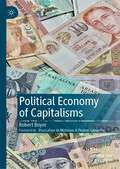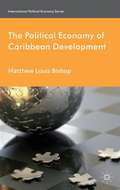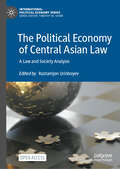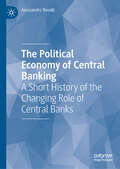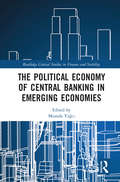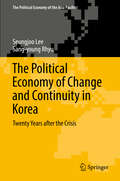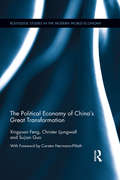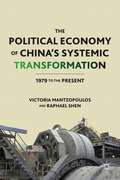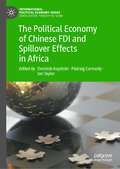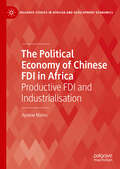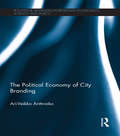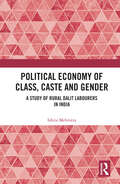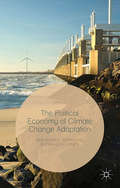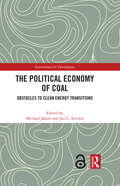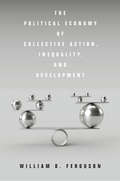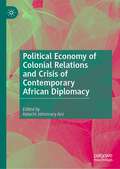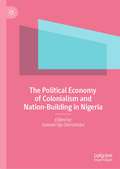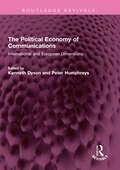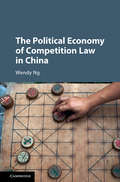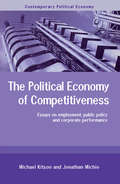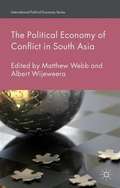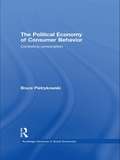- Table View
- List View
Political Economy of Capitalisms
by Robert BoyerThis book is the English language translation of the French publication Économie Politique des Capitalismes. Research in this book presents institutional and historical macroeconomics, through an analysis of wage-labour nexus, innovation systems, monetary and financial systems, integration into the world economy, formation of economic policy configurations, and the history of economic theories. In doing so, the book addresses how and why economic regularities change in long run, and why do macroeconomic adjustments differ across countries within the same historical period. It shows how institutional changes that have occurred since the 1970s and the research on the transformation of the American and French capitalism, have led to the emergence of a research agenda, known as Régulation Theory. Readers would understand the permanent transformations of capitalism and its crises, given the book’s inclusion of long-term historical studies, systematic international comparisons for the contemporary period, and the exploration of the institutional and social foundations of microeconomics which has led to the evolution of various brands of capitalism. This translated work includes an introductory chapter by Prof. Elsa Lafaye de Micheaux and Thomas Lamarche.
The Political Economy of Carbon Trading
by Mikell Hyman Patia Mcgrath Forest Reinhardt Nazli Z. Uludere Aragon Gunnar TrumbullGlobal climate change is an increasingly prominent political and business problem. Design of market-based systems to reduce carbon emissions has proven difficult. More broadly, national attempts to comply with the provisions of the Kyoto Protocol present both governments and firms with significant challenges. The design of international institutions that will be useful for managing change after the Kyoto period is a challenge both for Kyoto ratifiers and for countries like the United States that have not ratified the agreement. Creation of a post-Kyoto treaty on climate change requires agreement by China and the United States, the world's largest carbon emitters. The case summarizes the science and economics of climate change and encourages readers to contemplate the strategic and risk management problems that it presents to government officials and to business leaders in developed countries and in the developing world.
The Political Economy of Caribbean Development
by Matthew Louis BishopStudies of the global political economy have rarely engaged with development in the Caribbean, the thought of its indigenous intellectuals, or the non-sovereign territories of the region. Matthew Bishop compares the development of the independent English-speaking islands of St Lucia and St Vincent and their non-sovereign French neighbours, Martinique and Guadeloupe. By explaining how distinctive patterns of British and French colonialism and decolonisation came to bear on them, he investigates how very different patterns of development have subsequently ensued, often with startling consequences in this era of globalization and crisis. By engaging with the empirical reality of the Caribbean, his study sheds light on a range of wider debates relating to development, indigenous thought, post-colonial sovereignty, small states, and the contemporary evolution of the global political economy.
The Political Economy of Central Asian Law: A Law and Society Analysis (International Political Economy Series)
by Rustamjon UrinboyevThis open-access book provides fresh and much-needed insights into the interconnections between law, society and governance in Central Asia. By taking the interdisciplinary perspective of law and society, the book explores the social life of law and legal institutions in Central Asia in broader terms, encompassing not only the state legal system and institutions but also various informal (non-legal) forms of normative ordering. The topics covered within this book will be of interest to many scholars considering various theoretical and methodological challenges in studying law, governance, and informality in authoritarian regime contexts such as Central Asia. Considering interdisciplinary approaches taken within the volume, we aim to reach out to the students and scholars within the following disciplines and fields of study.• Central Asian Studies• Communist and post-communist studies• Anthropology: Economic Anthropology, Legal Anthropology, Anthropology of Law• Business sciences• Socio-legal studies• Transnational Politics and Governance • Law and economics
The Political Economy of Central Banking: A Short History of the Changing Role of Central Banks
by Alessandro RoselliThis book presents a comprehensive overview of central banks and their functions, from the first ‘banks of issue’ in the late 17th century to their place in modern advanced economies. It traces the growth of these institutions through time, and raises pertinent questions about their political representation in the present day. With a broad focus on themes of money creation, monetary policy, foreign exchange policy, and supervision and regulation, this book demonstrates how central banking grew significantly during the 19th century with the establishment of central banks as an independent institution. It discusses the transformations to central banking brought about by the upheaval of the 20th century, including world wars, economic crises, and social unrest, with the creation of ‘fiat money’ replacing a rigid gold standard, and charts these changes across different country settings including the evolving relationship of central banks to both democratic and authoritarian political systems. The book argues that challenges to central banking come from opposite sides: theories that see the government as the sole creator of currency and deny any autonomy to the central bank, and the emergence of private, unregulated cryptocurrencies, where the concept of money is framed in an anarchic vision of the society. Written in an accessible style, this book will be of interest to scholars of financial history and political economy, as well as any reader interested in the role of central banks in civic society.
The Political Economy of Central Banking in Emerging Economies (Routledge Critical Studies in Finance and Stability)
by Mustafa Ya 287 C 305Since the start of the Global Financial Crisis in 2008, research on central banking has gained momentum due to unusual levels of central bank activism and unconventional monetary policy measures in many countries. While these policies drew significant attention to advanced economy central banks, there has been much less academic focus on central banking in emerging economies. This book extends the research on the political economy of central banking by focusing on the emerging economies in Asia, Africa, Latin America, and the European periphery. Central banks are at the heart of economic policymaking, and their decisions have a significant impact on the social and economic well-being of citizens. Adopting an interdisciplinary political economy perspective, the contributions in this book explore the reciprocal relations between politics, economics, and central banks, and how the global and domestic political economy contexts influence central bank practices. The chapters employ diverse theoretical perspectives such as institutional and organizational theory, developmental state resource dependency, and gender studies, drawing on disciplines ranging from politics, international relations, public policy, management, finance, and sociology. This book will appeal to academics and students of central banking, political economy, and emerging economies, as well as professionals and policymakers engaged with central banks, monetary policy, and economic development.
The Political Economy of Change and Continuity in Korea: Twenty Years after the Crisis (The Political Economy of the Asia Pacific)
by Seungjoo Lee Sang-Young RhyuThis book analyzes the transformation of Korean political economy since the 1990s. In the wake of the Asian financial crisis of 1997, the political economy of South Korea has evolved around two diametrically opposed features: convergence into the Anglo-American model and the state-led strategic restructuring of industries. To unravel the peculiar nature of the political economy in Korea, the authors first identify major factors that contributed to the dual dynamics of change and continuity in Korea: external pressures, ideological shift in political leadership, and the pivotal role of the Korean government. Next, they examine the way in which these factors interacted with each other to reshape the evolutionary path of the Korean political economy. Using several case studies, the authors take us through the stages of this transformation, from the reform of the chaebols to the industrial restructuring of the auto, IT, and aerospace industries to the rise of South Korea’s Free Trade Agreements (FTA) initiative. In explaining the role that the dual dynamics of change and continuity play in modern Korean political economy, this book makes an important contribution to the existing literature and will be of interest to scholars and policy-makers concerned with development in Korea and the Asia-Pacific.
The Political Economy of China's Economic Zones
by George T. CraneIn 1979 China launched a new international economic policy with the establishment of four Special Economic Zones (SEZs): Shenzhen, Zhuhai, and Shantou in Guangdong Province and Xiamen in Fujian Province. Modelled loosely on export processing zones and free trade zones found in other less developed countries, the SEZs offer a variety of financial inducements to foreign investors in order to harness international business for national economic advantage. Designed to be a cornerstone of China's economic reforms, by 1985 the SEZs (in the mid-80s zone-like policies were extended to fourteen coastal cities) were scandal-ridden and fraught with serious problems. This work, the first book-length analysis in English of China's SEZs, examines the problems and promise of this innovative approach to "structural economic reform" and the comparative significance of the SEZs.
The Political Economy of China's Great Transformation (Routledge Studies in the Modern World Economy)
by Sujian Guo Xingyuan Feng Christer LjungwallThe Political Economy of China’s Great Transformation consists of three parts: first, covering the current political transformation, providing a general political background for the socio-economic, fiscal and urban and rural transformation. The book analyses the economic transformation and addresses the shortcomings of existing interpretations of the "Chinese Miracle" and develops a new multi-dimensional framework. In addition, it shows how the private sector has been developing and what a major role it is playing in pushing forward the overall economic development. The book also focuses on the analysis of China’s fiscal transformation. With the set of refined principles of fiscal federalism that the author has developed, it examines the problems of Chinese fiscal federalism in contrast to them. It further elaborates on topics such as the local government debt and explains why further reforms are necessary, making this book a very comprehensive read to understand China’s progress.
The Political Economy of China's Imperial Examination System (Elements in Political Economy)
by Erik H. Wang Clair Z. YangJust as councils and assemblies were central to European polities for centuries, the Imperial Examination System (Keju) constituted the cornerstone of state institutions in China. This Element argues that Keju contributed to political stability, and its emergence was a process, not a shock, with consequences initially unanticipated by its contemporaries. The Element documents the emergence of Keju using evidence from early Chinese empires to the end of the Tang Dynasty in the 10th century, including epitaphs and government documents. It then traces the selection criteria of Keju and trends in social mobility over the second millennium, leveraging biographical information from over 70,000 examinees and 1,500 ministers and their descendants. The Element uses a panel of 112 historical polities to quantify Keju's association with country-level political indicators against the backdrop of global convergence in political stability and divergence in institutions. This title is also available as Open Access on Cambridge Core.
The Political Economy of China’s Systemic Transformation
by Victoria Mantzopoulos Raphael ShenAfter three decades of reign, Mao left China a structurally rigid and functionally inefficient economy. The imperative for systemic transformation was self-evident. China has surpassed Japan as the second largest economy in the world. A statistical analysis of four countries indicates political stability and social calm helped gain the confidence of needed foreign investments. For China, it is foreign investment that has been fuelingits export growth which in turnis most instrumental in its development path. "
The Political Economy of Chinese FDI and Spillover Effects in Africa (International Political Economy Series)
by Dominik Kopiński Pádraig Carmody Ian TaylorWhat are the impacts of Chinese investment in Africa? Is it transforming economic development on the continent? This book is different from many other studies of this issue, as it unpacks the ‘black box’ of technological and learning spillover effects from Chinese firms to others. Rather than using econometric tools, which has now become a standard approach and come with their own set of challenges, the authors investigate the interactions between Chinese investors and African firms in terms of the transfer of technology and learning and explain why such interactions are rare. Only by understanding the reasons behind this rarity can approaches be developed to promote spillovers.
The Political Economy of Chinese FDI in Africa: Productive FDI and Industrialisation (Palgrave Studies in African and Development Economics)
by Ayalew MamoThis book provides unique insight into Chinese foreign direct investment (FDI) in Africa. With a particular focus on Ethiopia, it examines the impact of FDI on Africa’s industrial and manufacturing sector and the potential for productive FDI to advance industrialisation and create jobs for a large and young labour market. The creation of government policies and an institutional framework for the management of FDI is also examined, alongside lessons that can be learnt from policies that were less successful.This book offers a comparative perspective on FDI to highlight the forms of government intervention that maximise the economic benefits of FDI. It will be relevant to students, researchers, and policymakers interested in development economics and the political economy.
The Political Economy of City Branding (Routledge Advances in Regional Economics, Science and Policy #2)
by Ari-Veikko AnttiroikoGlobalization affects urban communities in many ways. One of its manifestations is increased intercity competition, which compels cities to increase their attractiveness in terms of capital, entrepreneurship, information, expertise and consumption. This competition takes place in an asymmetric field, with cities trying to find the best possible ways of using their natural and created assets, the latter including a naturally evolving reputation or consciously developed competitive identity or brand. The Political Economy of City Branding discusses this phenomenon from the perspective of numerous post-industrial cities in North America, Europe, East Asia and Australasia. Special attention is given to local economic development policy and industrial profiling, and global city rankings are used to provide empirical evidence for cities’ characteristics and positions in the global urban hierarchy. On top of this, social and urban challenges such as creative class struggle are also discussed. The core message of the book is that cities should apply the tools of city branding in their industrial promotion and specialization, but at the same time take into account the special nature of their urban communities and be open and inclusive in their brand policies in order to ensure optimal results. This book will be of interest to scholars and practitioners working in the areas of local economic development, urban planning, public management, and branding.
Political Economy of Class, Caste and Gender: A Study of Rural Dalit Labourers in India
by Ishita MehrotraThis book examines the structures of power and hierarchies within the agrarian political economy in India, with a focus on gender. It analyses various forms of inequalities within rural structures while situating the position of women and Dalit agriculture labourers within these discriminate networks of social exclusion, political marginalisation and poverty. The book maps the impacts of neoliberal capitalist globalization on agrarian relations to identify who labourers are and how rural diversification is shaped by class, caste and gender hierarchies specifically in the villages of eastern Uttar Pradesh. It looks at occupational patterns of women workers, labour relations, and reconceptualization of labour. The author documents the experiences of exploitation as well as forms of resistance and collective action of rural women labourers. In doing this, the book deals with processes witnessed across the global South – rural distress, depeasantisation, migration, feminization of agriculture as well as identity-based inequalities in rural labour markets. Rich in empirical data, the book will be useful for scholars and researchers of labour studies, women’s studies, political economy, agrarian economy, agrarian sociology, rural sociology, sociology, development studies and political studies.
The Political Economy of Climate Change Adaptation
by Benjamin K. Sovacool Björn-Ola LinnérDrawing on concepts in political economy, political ecology, justice theory, and critical development studies, the authors offer the first comprehensive, systematic exploration of the ways in which adaptation projects can produce unintended, undesirable results.This work is on the Global Policy: Next Generation list of six key books for understanding the politics of global climate change.
The Political Economy of Coal: Obstacles to Clean Energy Transitions (Environment for Development)
by Michael JakobThis volume provides an overview of the political economy of coal in diverse country contexts. Coal is the largest source of greenhouse gas emissions globally, accounting for about 40 percent of energy-related CO2 emissions. Continued construction of coal-fired power plants could make the climate targets of the Paris Agreement infeasible to achieve. In spite of sharply declining costs for renewable energy sources, many countries still heavily rely on coal to meet their energy demand. The predominance of coal can only be adequately understood in light of the political factors that determine energy policy formulation. To this end, this edited volume assembles a wide variety of case studies exploring the political economy of coal for across the globe. These includes industrial and developing nations, coal importers and exporters as well as countries that are either substantial coal users, are just beginning to ramp up their capacities, or have already initiated a coal phase-out. Importantly, all case studies are structured along a unifying framework that focuses on the central actors driving energy policy formulation, their main objectives as well as the context that determines to what extent they can influence policy making. This large set of comparable studies will permit drawing conclusions regarding key similarities as well as differences driving coal use in different countries. This book will be of great interest to students and scholars of energy, climate change, resource management, and sustainable development. It will also appeal to practitioners and policymakers involved in sustainable development.
The Political Economy of Collective Action, Inequality, and Development
by William D. FergusonThis book examines how a society that is trapped in stagnation might initiate and sustain economic and political development. In this context, progress requires the reform of existing arrangements, along with the complementary evolution of informal institutions. It involves enhancing state capacity, balancing broad avenues for political input, and limiting concentrated private and public power. This juggling act can only be accomplished by resolving collective-action problems (CAPs), which arise when individuals pursue interests that generate undesirable outcomes for society at large. Merging and extending key perspectives on CAPs, inequality, and development, this book constructs a flexible framework to investigate these complex issues. By probing four basic hypotheses related to knowledge production, distribution, power, and innovation, William D. Ferguson offers an analytical foundation for comparing and evaluating approaches to development policy. Navigating the theoretical terrain that lies between simplistic hierarchies of causality and idiosyncratic case studies, this book promises an analytical lens for examining the interactions between inequality and development. Scholars and researchers across economic development and political economy will find it to be a highly useful guide.
Political Economy of Colonial Relations and Crisis of Contemporary African Diplomacy
by Kelechi Johnmary AniThe book presents a historical account of the colonial foundation of African economy and diplomacy. It reveals how the colonial companies and their agents penetrated different parts of Africa and entrenched Western colonialism and imperialism. Ironically, the arrival of these colonial companies became a driver of colonial labour migration as the educated and few privileged African people have to move towards the location of the colonial companies in order to eke-out improved standard of living. It presents the dynamics of import and export trade as promoted by the colonial companies. Consequently, the second part of the book raised the nature of relations amongst some independent African states. First, it reveals the deep-rooted challenge of poverty, migration problem, xenophobia in South Africa and resource conflicts within sovereign border areas of Nigeria and Cameroon as well as the Ethiopian dam crisis with Egypt, as some negative effects of colonialism on some African states. Secondly, it advocated for the advancement of African sports diplomacy, balancing of Chinese African trade diplomacy and improved labour migration within Africa as some paths to sustainable diplomacy in continent.
The Political Economy of Colonialism and Nation-Building in Nigeria
by Samuel Ojo OloruntobaThis book examines the ways in which colonialism continues to define the political economy of Nigeria sixty years after gaining political independence from the British. It also establishes a link between colonialism and the continued agitation for restructuring the political arrangement of the country. The contributions offer various perspectives on how the forceful amalgamation of disparate units and diverse nationalities have undermined the realization of the development potential of Nigeria.The book is divided into two parts. The first part interrogates the political economy of colonialism and the implications of this on economic development in contemporary Nigeria. The second part examines nation-building, governance, and development in a postcolonial state. The failure of the postcolonial political elites to ensure inclusive governance has continued to foster centrifugal and centripetal forces that question the legitimacy of the state. The forces have deepened calls for secession, accentuated conflicts and predispose the country to possible disintegration. A new government approach is required that would ensure equal representation, access to power and equitable distribution of resources.
The Political Economy of Communications: International and European Dimensions (Routledge Revivals)
by Kenneth Dyson Peter HumphreysFirst published in 1990, The Political Economy of Communications explores the central theme of the relationship between politics and markets in policy development. The contributors show how governments have been drawn into increasing interdependency by technological and market developments, with international institutions like the European Community becoming more important in these policy areas. They argue that neither government ideologies nor market and technological forces offer an adequate account of the processes of change in communications policy. These conclusions lead to a critique of central theories of international political economy, notably neo-liberalism, and the authors advocate instead a neo-pluralist perspective for the study of political economy of communications – an approach that takes institutions much more seriously as a central unit of analysis. The book will be of interest to students of international relations, European studies, and media and telecommunication studies, as well as to political scientists and economists concerned with public policy.
The Political Economy of Competition Law in China
by Wendy NgThe Political Economy of Competition Law in China provides a unique perspective of China's competition law that is situated within its legal, institutional, economic, and political contexts. Adopting a framework that focuses on key stakeholders and the relevant governance and policy environment, and drawing upon stakeholder interviews, case studies, and doctrinal analysis, this book examines China's anti-monopoly law in the context of the political economy from which it emerged and in which it is now enforced. It explains the legal and economic reasoning used by Chinese competition authorities in interpreting and applying the anti-monopoly law, and offers valuable and novel insights into the processes and dynamics of law- and decision-making under that law. This book will interest scholars of competition law and professionals advising clients that operate in China, as well as scholars of Chinese law, Asian law, comparative law, and political and social science.
The Political Economy of Competitiveness: Corporate Performance and Public Policy (Routledge Studies in Contemporary Political Economy)
by Michael Kitson Jonathan MichieThe Political Economy of Competitiveness offers an original perspective on the relationship between economic theory and policy. It places the issues within an accessible political economy perspective. Rejecting the narrowness of mainstream economics the authors deploy an interdisciplinary approach to the problem of economic growth, placing it in its historical and political context. Issues covered include: * trade theory and policy * industrial decline and policy * markets, competition and innovation * globalisation, unemployment and government policy. The book provides a valuable guide to the major economic policy issues for both economists and business students.
The Political Economy of Conflict in South Asia
by Matthew J. Webb Albert WijeweeraDestructive conflicts have thwarted growth and development in South Asia for more than half a century. This collection of multi-disciplinary essays examines the economic causes and consequences of military conflict in South Asia from a variety of perspectives embracing fiscal, social, strategic, environmental and several other dimensions.
The Political Economy of Consumer Behavior: Contesting Consumption (Routledge Advances in Social Economics)
by Bruce PietrykowskiConsumption forms a major part of people’s lives. As such, geographers, historians of technology and sociologists have devoted much attention to trying to figure out what makes consumption meaningful. By contrast, economists have been content to hold onto theories of consumption that depend on a self-interested representative agent making utility maximizing decisions. Pietrykowski develops this alternative account through the recovery of past attempts to forge a different analytical approach to the study of consumption. In particular, theories of consumption espoused by home economists, psychological economists and Regulation school theorists are critically reviewed. These research projects, marginalized by the mainstream, are the precursors of contemporary scholarship in feminist, behavioural and radical political economics. Reclaiming this work greatly enlarges the scope for contemporary research in consumer behavior. Pietrykowski then provides a richly textured set of case studies of green automobility, slow food and alternative/local currency in order to explore the diversity of user cultures and to highlight resistant forms of consumer practice. By carefully interweaving historical and interdisciplinary research Pietrykowski creates a lively and incisive critique of mainstream economics This monograph will be of interest to academic economists, sociologists, historians and graduate students. In addition, the economics of consumption would also be of interest to readers in management, marketing and schools of business administration.
